Illinois Democrats’ law blocking candidates from ballot remains unconstitutional
A lawsuit was brought challenging the slating prohibition part of the law as it went into effect immediately, impacting this year’s election.
The state’s law prohibiting candidates who didn’t run in a primary from getting on the general election ballot won’t go into effect this year after the Illinois Supreme Court dismissed the state’s appeal of a lower court ruled it unconstitutional.
Ron Andermann, a Republican running for the statehouse in the Chicago suburbs, said his research indicates the process of slating has been going on for as long as Illinois has been a state.
“It was a matter of giving people choice,” Andermann told The Center Square outside the Democratic National Convention in Chicago earlier this week. “So in the middle of the election process, the state legislature in the matter of 48 hours under the guise of a different named bill changed the law and the governor signed it and kicked 14 of us off the ballot.”
In May, the Democratic supermajority amended Senate Bill 2412 to be a bill about election law instead of a child welfare bill. The measure prohibited slating and included three non-binding referendums for voters across the state. Within three days, both chambers approved the changes and the governor signed the measure into law.
"It really does make sure that we don’t have backroom deals to put people on the ballot and run as a result of some small group of people in a smoke-filled room making the choice," Pritzker said before the Senate passed the measure. "So I think, to me, more transparency is better."
A lawsuit was brought challenging the slating prohibition part of the law as it went into effect immediately, impacting this year’s election.
After winning in the lower court, the state appealed directly to the Illinois Supreme Court.
Leslie Collazo, a Republican running for the statehouse in Chicago, was the lead plaintiff. Before Friday's ruling and outside the Democratic National Convention in Chicago, she highlighted what she characterized as the hypocrisy of Illinois Democrats.
“You know what’s interesting is that I was a slated candidate similar to Kamala Harris, and I don’t understand why it was such a problem for me to try to get on the ballot but then they go ahead and just shove this candidate in our face for prescient in 2024,” Collazo told The Center Square.
Democrats just wrapped up their Democratic National Convention in Chicago where Harris accepted the party's nomination a month after President Joe Biden decided not to seek reelection.
Friday, the Supreme Court deadlocked on the state's appeal of the lower court's ruling the slating prohibition was unconstitutional with two justices recusing themselves.
“In this case, two justices of this court have recused themselves, and the remaining members of the court are divided so that it is not possible to secure the constitutionally required concurrence of four judges for a decision (see Ill. Const. 1970, art. VI, § 3). Accordingly, the appeal is dismissed. The effect of this dismissal is the same as an affirmance by an equally divided court of the decision under review but is of no precedential value,” the opinion said.
Justices P. Scott Neville and Joyce V. Cunningham took no part in the decision.
“We applaud the courts’ decision to uphold candidates’ rights and strike down Illinois legislators’ partisan attempt to exclude their political opponents from the ballot,” said Jeffrey Schwab, senior counsel at the Liberty Justice Center.
Illinois Senate Minority Leader John Curran, R-Downers Grove, said Gov. J.B. Pritzker signed another purely partisan law that violated constitutional rights of Illinois citizens.
“This latest attempted power grab by Gov. Pritzker and the legislative Democrats that would have reduced voters’ choice in the upcoming election was thankfully rejected by the courts for the final time, and voters, rather than politicians, will have the final say on Election Day,” he said in a statement.
Messages to the offices of the governor, Illinois House Speaker and Senate president were not immediately returned.












